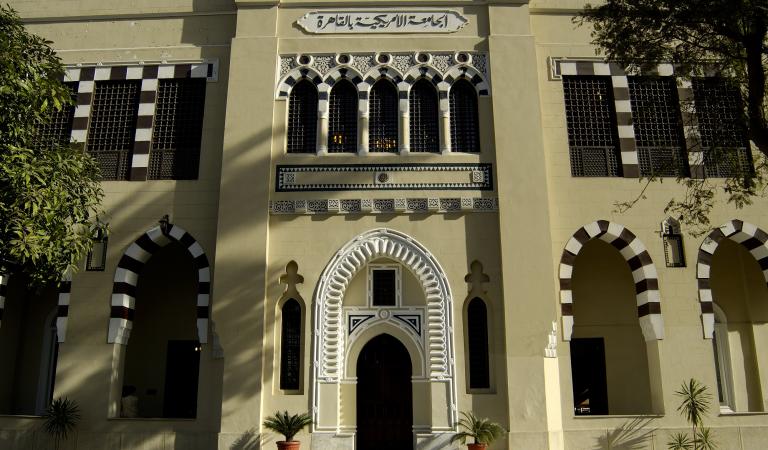
Members of the American University in Cairo student movement blocked the university gates Sunday, not allowing students to enter. Many students did not agree with the strategy, and a few physical fights erupted between them and the students blocking the gates.
The protesting students want the administration to reduce the seven percent increase in tuition fees proposed for this year. They are also, separately, demanding a tuition fee cap so that fees do not increase for current students.
“We have taken all legal actions — we talked with the administration of the university, we signed petitions from more than 3,000 students and we had a parents forum; however, the administration has totally ignored our demand, which is not to add the seven percent increase to the fees, so we decided to escalate the case by striking,” said Mina Raafat, one of the AUC students who supported yesterday’s strike.
Ten strike organizers have been suspended by the student disciplinary committee and Vice President for Student Affairs Brian MacDougall as a result of their role in prohibiting students from entering the university.
One of the students suspended is Nezar al-Zanaty, the student union vice president, who says he supported the strike as a student, not as a representative of the student union.
Starting at 8 am on 16 September, many students gathered at the university gates and closed them.
“We couldn’t interfere,” says one of the security staff members, who requested anonymity. “That is not our job, we are here only for security, and the security supervisor, Salama Omar, is standing on front of the closed gate to check the ID of anyone accessing the university.”
“We will not support any act that demonstrates unjust infringement to the rights, liberties and freedom of choice of other students and members of AUC community,” read a statement posted to the student union’s Facebook page.
Student union activist Mostafa Shams says “the organizer of this strike is the whole student movement.”
However, MacDougall stresses that the approach that the administration has taken is to advise students who are preventing the gates from being opened that they will face suspension. He also says the suspended students will not be allowed on the AUC campus until the investigation is completed.
MacDougall adds that the administration committed to consider a tuition cap model but not to introducing it. He rejects the idea of the tuition fee cap for current students, saying that any model must ensure that future students don’t pay a disproportionate share of any increase.
“We were keen to say now that the increase will be added to the fees for the academic years 2014, 2015 and 2016, in order not to surprise anyone,” he says.
Over the three hours of the strike, during which hundreds of AUC students couldn’t make it onto campus, there were many disputes between students. Some were against the closure of the gates and against forcing students not to attend classes.
“I don’t accept what’s happening. I would rather talk to students and convince them not to attend their classes instead of forcing them not to enter from the gates,” says Islam Shabana, a student and a leftist.
AUC witnessed student strikes last year that failed to bring about change. Graduating senior Mohamed Hassan, who is also known as Antak and who is one of the lead organizers of the action, says the gate blockade strategy had been used back in 2003.
A few students whom he calls “heroes” managed to close the university for two days and force the university to cancel a five percent tuition fee increase.
The blockade looks set to be repeated on Wednesday, when AUC President Lisa Anderson returns from the US.




